Period Products (Free Provision) Bill - Call for Views
Overview
Pat Catney MLA (Member of the Legislative Assembly) is an elected representative from the Social Democratic and Labour Party in Lagan Valley.
He is concerned that products to keep people comfortable and hygienic when they are having menstrual periods are very costly. Some people can’t afford them and this prevents them participating fully in the opportunities they are offered in their lives, such as studying at school and college. Most of these people are women and girls.
The Member has put his idea that period products should be provided free by Government departments in the form of a draft law (bill) for the Assembly to consider.
The Bill is called the Period Products (Free Provision) Bill. The text of the bill can be found at this link:
The Member wrote about how he decided to go about arranging for Departments to provide period products, in a document called the Explanatory and Financial Memorandum which you can read here.
The Assembly discussed this proposal and agreed with its principles, during a debate of the whole Assembly called the Second Stage debate. Their discussion is at this link.
Why your views matter
Although the Bill will involve several Departments, the Assembly gave the Bill to the Education Committee to work on it. This Committee wants to hear from you about your perspective on the Bill.
You can watch a video about the stages of lawmaking in the Assembly here:
Some terms we use when we’re working on making law:
A bill is a law that is being discussed but hasn’t been made yet, ie a draft.
You are invited to give your views on this draft law to help elected Members of the Assembly to decide whether to accept, reject or change it.
Changes to a law while it is in draft are called amendments.
Each idea in the draft law/bill is called a provision.
Some bills contain both clauses, which are statements of each key idea; and schedules, which give more detailed information about each key idea. Clauses and schedules are both referred to as provisions. They provide a clear statement of new law.
At the Assembly, a Committee (in this case the Education Committee) will invite people who will be affected by the new law to tell us what they like and don’t like about it.
The Committee does this because a) law should reflect the values of people in society; b) everyone in society will be affected by the law if it is made, and c) because you may point out something from your experience that is missing from the bill.
Young people may want to tell us if they think the proposal is helpful and whether the arrangements proposed seem straightforward and easy to access.
Parents, teachers, wider family, schools, clubs, churches, community organisations and medics may also want to tell us what they think of this idea.
The Committee will consider your written replies, some oral evidence and other relevant advice about making good legislation. It will then report its research and findings to the Assembly, and the full Assembly will take some time to discuss changes (amendments) and make decisions about the bill.
The Assembly can decide against the new law if this process does not go well. However, at the end of the process, if the Assembly is content, the law is made.
This is called enactment, when the bill becomes an Act.
Often some preparation has to take place in the real world before an Act can begin to take force. The bill creates some space and time for this by stating that the new Act will commence/begin to take effect after a period of time has passed. This is called a commencement clause.
Now on to the bill!
What happens next
Following the closure of this call for evidence and views the Committee wll commence oral evidence sessions and will consider all written and oral evidence before moving to deliberate on the Clauses of the Bill.
Responses to this call for evidence will be published in accordance with Northern Ireland Assembly protocols.

Share
Share on Twitter Share on Facebook